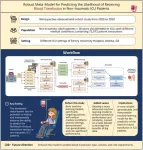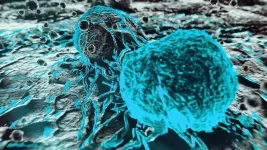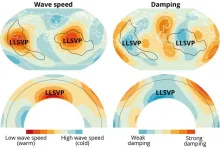(Press-News.org) Macquarie University researchers have worked with an international team of scientists to achieve a major milestone in synthetic biology by completing the creation of the final chromosome in the world's first synthetic yeast genome.
This achievement represents the completion of the global Sc2.0 project to create the world's first synthetic eukaryotic genome from Saccharomyces cerevisiae (baker's yeast) and a new-to-nature tRNA neochromosome.
Using cutting-edge genome-editing techniques, including the CRISPR D-BUGS protocol, the team identified and corrected genetic errors that impacted yeast growth. These changes restored the strain’s ability to grow on glycerol, a key carbon source, under elevated temperatures.
The breakthrough, published this week in Nature Communications, demonstrates how engineered chromosomes can be designed, built and debugged to create more resilient organisms that could help secure supply chains for food and medicine production in the face of climate change and future pandemics.
“This is a landmark moment in synthetic biology,” says Professor Sakkie Pretorius, Co-Chief Investigator and Deputy Vice Chancellor (Research) of Macquarie University.
“It is the final piece of a puzzle that has occupied synthetic biology researchers for many years now.”
Distinguished Professor Ian Paulsen, Director of the ARC Centre of Excellence in Synthetic Biology, who co-led the project, says: “By successfully constructing and debugging the final synthetic chromosome, we’ve helped complete a powerful platform for engineering biology that could revolutionise how we produce medicines, sustainable materials and other vital resources.”
The research team used specialised gene editing tools to identify and fix problems in the synthetic chromosome affecting how well the yeast could reproduce and grow under challenging conditions.
They discovered that the placement of genetic markers near uncertain gene regions accidentally interfered with how essential genes were turned on and off, particularly affecting crucial processes like copper metabolism and how cells divide their genetic material.
“One of our key findings was how the positioning of genetic markers could disrupt the expression of essential genes,” says co-lead author Dr Hugh Goold, research scientist at The NSW Department of Primary Industries and Honorary Postdoctoral Research Fellow from Macquarie University’s School of Natural Sciences.
“This discovery has important implications for future genome engineering projects, helping establish design principles that can be applied to other organisms.”
The completion of the chromosome known as synXVI allows scientists to explore new possibilities in metabolic engineering and strain optimisation. The synthetic chromosome includes features that enable researchers to generate genetic diversity on demand, accelerating the development of yeasts with enhanced capabilities for biotechnology applications.
“The synthetic yeast genome represents a quantum leap in our ability to engineer biology,” says Dr Briardo Llorente, Chief Scientific Officer at the Australian Genome Foundry.
The construction of such a large synthetic chromosome was only possible using the robotic instrumentation in the Australian Genome Foundry.
“This achievement opens up exciting possibilities for developing more efficient and sustainable biomanufacturing processes, from producing pharmaceuticals to creating new materials,” says Dr Llorente.
The research provides valuable insights for future synthetic biology projects, including potential applications in engineering plant and mammalian genomes. The team's new design principles for synthetic chromosomes to avoid placing potentially disruptive genetic elements near important genes will help other researchers working on synthetic chromosomes.
Macquarie University is responsible for more than 12 per cent of the entire Sc 2.0 project, and this contribution was supported by the NSW Government’s Department of Primary Industries, the Australian Research Council Centre of Excellence in Synthetic Biology, and external grants from Bioplatforms Australia and the NSW Chief Scientist and Engineer.
The paper ‘Construction and iterative redesign of synXVI a 903 kb synthetic Saccharomyces cerevisiae chromosome’ was published in Nature Communications on 20 Jan 2025.
END
Final synthetic yeast chromosome unlocks new era in biotechnology
Construction of the final synthetic chromosome at Macquarie University completes more than a decade of global effort to create the first designer genome
2025-01-22
ELSE PRESS RELEASES FROM THIS DATE:
AI-powered prediction model enhances blood transfusion decision-making in ICU patients
2025-01-22
Researchers at Emory University have developed a groundbreaking artificial intelligence (AI) model capable of accurately predicting the likelihood of blood transfusion in non-traumatic intensive care unit (ICU) patients. Published in Health Data Science, the study addresses longstanding challenges in predicting transfusion needs across diverse patient groups with varying medical conditions.
Blood transfusions are critical in managing anemia and coagulopathy in ICU settings, yet current clinical decision support systems often ...
MD Anderson Research Highlights for January 22, 2025
2025-01-22
HOUSTON ― The University of Texas MD Anderson Cancer Center’s Research Highlights showcases the latest breakthroughs in cancer care, research and prevention. These advances are made possible through seamless collaboration between MD Anderson’s world-leading clinicians and scientists, bringing discoveries from the lab to the clinic and back.
Novel allogeneic NK cell therapy from induced pluripotent stem cells shows encouraging efficacy in relapsed or refractory B-cell lymphoma patients
Patients ...
Scholastica announces integration with Crossmark by Crossref to expand its research integrity support
2025-01-22
CHICAGO, IL (January 22, 2025) — Scholastica, a leading software solutions provider for academic journals, has released a new integration with Crossmark by Crossref, the industry standard mechanism for reporting updates to published research.
The Crossmark integration is now available to journals subscribed to the Scholastica Open Access Publishing Platform that are published by a Crossref member organization participating in the Crossmark service.
“Clearly communicating article updates and retractions is critical to maintaining the integrity of the scholarly record, and with this ...
Could brain aging be mom’s fault? The X chromosome factor
2025-01-22
Women are born with two X chromosomes and inherit one from each parent. But in every cell of their body, just one X chromosome is needed – so the other is randomly inactivated. Some cells use only a maternal X chromosome; others rely only on the paternal X.
Now, UC San Francisco researchers have found that when the brain cells of female mice express only a maternal X chromosome, their memory and cognitive skills deteriorate faster than female mice that express both maternal and paternal X chromosomes.
The discovery, which appears Jan. 22 in Nature, could explain the variation in brain aging between the sexes, since males inherit only a maternal X, as ...
Subterranean ‘islands’: strongholds in a potentially less turbulent world
2025-01-22
Deeply hidden in Earth’s mantle there are two huge ‘islands’ with the size of a continent. New research from Utrecht University shows that these regions are not only hotter than the surrounding graveyard of cold sunken tectonic plates, but also that they must be ancient: at least half a billion years old, perhaps even older. These observations contradict the idea of a well-mixed and fast flowing Earth’s mantle, a theory that is becoming more and more questioned. “There is less flow in Earth’s ...
Complete recombination map of the human-genome, a major step in genetics
2025-01-22
Complete recombination map of the human genome, a major step in genetics
Scientists at deCODE genetics/Amgen have constructed a complete map of how human DNA is mixed as it is passed down during reproduction. The map marks a major step in the understanding of genetic diversity and its impact on health and fertility. It continues 25 years of research at deCODE genetics into how new diversity is generated in the human genome, and its relationship to health and disease.
The new map, appearing today in the online edition of Nature, is the first to incorporate shorter-scale shuffling, ...
Fighting experience plays key role in brain chemical’s control of male aggression
2025-01-22
Like humans, mice will compete over territory and mates, and show increased confidence in their fighting skills the more they win. At first, a brain chemical called dopamine is essential for young males to master this behavior. But as they gain experience, the chemical grows less important in promoting aggression, a new study shows.
Dopamine has been linked to male aggression for decades. How past experiences might influence this relationship, however, had until now been unclear.
In experiments in rodents, a team led by researchers at NYU Langone Health boosted activity in dopamine-releasing cells in a part of the brain called the ventral tegmental area. The findings revealed that in ...
Trends in preventive aspirin use by atherosclerotic cardiovascular risk
2025-01-22
About The Study: Following landmark clinical trials and changes in guideline recommendations, self-reported primary prevention aspirin use decreased among older adults and adults with low atherosclerotic cardiovascular disease (ASCVD) risk for whom aspirin was not recommended, but also decreased among adults with higher ASCVD risk for whom aspirin may still be recommended. Despite these reductions, many patients with limited likelihood to benefit reported continuing to take aspirin.
Corresponding Author: To contact the ...
Sex differences in long COVID
2025-01-22
About The Study: This study found that female sex was associated with an increased risk of long COVID compared with male sex, and this association was age, pregnancy, and menopausal status dependent. These findings highlight the need to identify biological mechanisms contributing to sex specificity to facilitate risk stratification, targeted drug development, and improved management of long COVID.
Corresponding author: To contact the corresponding author, Dimpy P. Shah, M.D., Ph.D., email ShahDP@uthscsa.edu.
To ...
Medically recommended vs nonmedical cannabis use among US adults
2025-01-22
About The Study: The results of this study showed that adults ages 18 to 49 reporting medical-only or medical-nonmedical cannabis use vs nonmedical-only use had higher prevalence of cannabis use disorder at all severity levels and reported more frequent cannabis use. These findings suggest that medically recommended cannabis is not associated with reduced addiction risk compared with nonmedical use.
Corresponding author: To contact the corresponding author, Nora D. Volkow, M.D., email nvolkow@nida.nih.gov.
To access the embargoed study: ...
LAST 30 PRESS RELEASES:
Smithsonian planetary scientists discover recent tectonic activity on the Moon
Government censorship of Chinese chatbots
Incorporating a robotic leg into one’s body image
Brain imaging reveals how wildlife photos open donor wallets
Wiley to expand Advanced Portfolio
Invisible battery parts finally seen with pioneering technique
Tropical forests generate rainfall worth billions, study finds
A yeast enzyme helps human cells overcome mitochondrial defects
Bacteria frozen in ancient underground ice cave found to be resistant against 10 modern antibiotics
Rhododendron-derived drugs now made by bacteria
Admissions for child maltreatment decreased during first phase of COVID-19 pandemic, but ICU admissions increased later
Power in motion: transforming energy harvesting with gyroscopes
Ketamine high NOT related to treatment success for people with alcohol problems, study finds
1 in 6 Medicare beneficiaries depend on telehealth for key medical care
Maps can encourage home radon testing in the right settings
Exploring the link between hearing loss and cognitive decline
Machine learning tool can predict serious transplant complications months earlier
Prevalence of over-the-counter and prescription medication use in the US
US child mental health care need, unmet needs, and difficulty accessing services
Incidental rotator cuff abnormalities on magnetic resonance imaging
Sensing local fibers in pancreatic tumors, cancer cells ‘choose’ to either grow or tolerate treatment
Barriers to mental health care leave many children behind, new data cautions
Cancer and inflammation: immunologic interplay, translational advances, and clinical strategies
Bioactive polyphenolic compounds and in vitro anti-degenerative property-based pharmacological propensities of some promising germplasms of Amaranthus hypochondriacus L.
AI-powered companionship: PolyU interfaculty scholar harnesses music and empathetic speech in robots to combat loneliness
Antarctica sits above Earth’s strongest “gravity hole.” Now we know how it got that way
Haircare products made with botanicals protects strands, adds shine
Enhanced pulmonary nodule detection and classification using artificial intelligence on LIDC-IDRI data
Using NBA, study finds that pay differences among top performers can erode cooperation
Korea University, Stanford University, and IESGA launch Water Sustainability Index to combat ESG greenwashing
[Press-News.org] Final synthetic yeast chromosome unlocks new era in biotechnologyConstruction of the final synthetic chromosome at Macquarie University completes more than a decade of global effort to create the first designer genome



